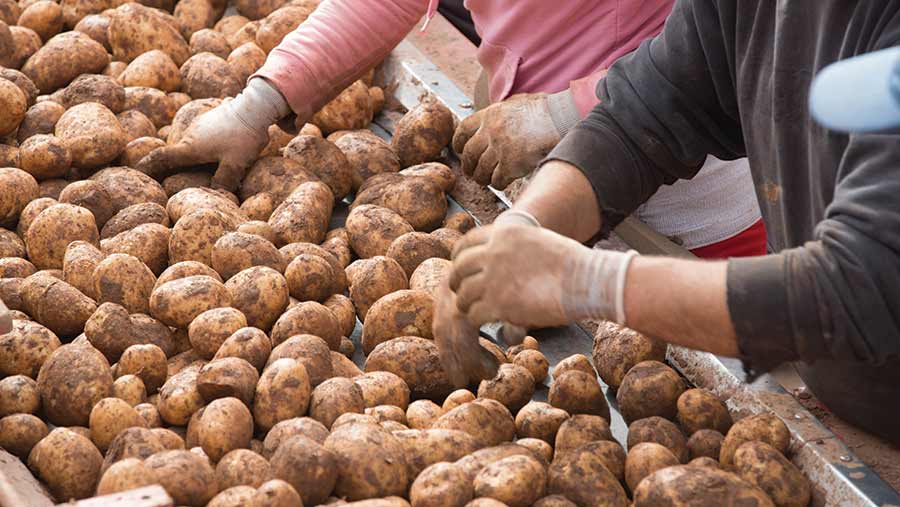Tips on how to recruit good arable farm staff
 © Tim Scrivener
© Tim Scrivener Speak to any farmer and they will tell you the same thing – recruiting and retaining good farm staff has never been more difficult, or more important to get right.
Finding the right person for the job is essential in today’s farm workplace, especially given the greater level of expertise required and the heavier responsibilities many roles now carry.
According to independent labour productivity specialist Chris Rose, there are a number of issues surrounding the agricultural labour market at the moment, all of which can make it tricky to find the right staff.
See also: Enter this year’s Farmers Apprentice competition
“There is an ageing workforce in agriculture, in part caused by a lack of both young and quality people coming into the industry,” he says.
“In addition, there is more competition for staff from other industries, while there is an increased requirement for technical skills and expertise. Farm staff are working at a much higher level now.”
Identifying people with the standards and aptitude required can seem to be an impossible task, he acknowledges. “That is why it is important to set out your expectations, provide the support and training staff need and have a formal appraisal system.”
Mr Rose believes all employers must have a company mission statement, together with company values and ethics.
“If you don’t know what your company is about, what it stands for and why it is in business, then you can’t expect your staff to know. Be clear about the markets you are serving, the benefits you offer and how you meet your customers’ requirements.
“As the boss, you need to walk the walk and talk the talk.”
Recruitment channels
- Trade journals
- Recruitment agencies
- Word of mouth
- Colleges and universities
- Schools and apprenticeship schemes
- Eastern Europe (agencies)
Job descriptions
For a specific vacancy, prepare a job description, he advises. “This needn’t include the details of all the tasks, but it should provide a structure.”
Results-oriented job descriptions can be valuable for farm staff, he believes. “They focus on the tasks and their successful accomplishment. Not only are they useful at the recruitment stage, they can be used to identify training needs, carry out disciplinary procedures and conduct performance appraisals.”
Furthermore, setting out standard operating procedures is often helpful, he adds. “These give a detailed description of the steps or processes involved in a task. So they include all the preparation required as well as the materials, tools and machinery involved.
“In other words, it is your definition of good or best practice. Putting it down on paper makes it clear what you expect from your staff.”
Interviewing
Once a shortlist of potentially suitable candidates has been drawn up, allow a couple of hours for each interview and include a tour of the farm in that time, recommends Mr Rose.
“This allows you to gauge their interest. Ask open questions to draw out the information you need and try to find out about their home life – if they have to relocate for the job, their family and any dependents are a consideration.”
Have two people conducting the interview and always discuss the candidate with the co-interviewer afterwards. “It is surprising what you can miss, or how someone else assesses a potential employee and their suitability.”
While previous experience can be essential, especially where the employee will be working on their own, attitude is often just as important, he says.
“If you need them to work late at busy times, they must be willing to do this. Find out what their concerns about the job are – they will have some.”
Other key skills
Delegation
- Define the task
- Select the individuals
Assess ability and training needs
- Explain the reasons
- State required results
- Consider resources required
- Agree deadlines
- Support and communicate
- Give feedback on results
Empowerment
- Foster open communication
- Reward self-improvement
- Encourage safe failure
- Provide plenty of context
- Clearly define roles
- Require accountability
- Support their independence
- Appreciate their efforts
Psychometric testing can be useful for certain roles, or where the new recruit will be part of a larger team, he adds.
Dealing with leavers
Whether a member of the farm staff is leaving to take up a new position or retiring after a long period of employment, the process should be planned and phased accordingly.
“In both of these situations, it is worth consulting with your remaining staff,” says Mr Rose. “It is often a mistake to rush into a long-term solution and they may have a better short-term plan.”
Both scenarios provide an opportunity to promote internally or replace with contractors offering specialist skills, as well as recruiting a new member of staff, he points out.
“An exit interview should be carried out – it can be very revealing. Where a good member of staff is leaving, it can help you to understand why.”
For retirement, it is worth having a new team member shadowing the existing member of staff for their last few months so knowledge and skills can be passed on, he adds.
Motivation
Surprisingly, money is low on the list of things that motivate people, reveals Mr Rose.
“In the Herzberg companies survey, the top three motivators were achievement, recognition and work satisfaction,” he says. “These were followed by responsibility, advancement and personal growth.”
Money was in twelfth place, he reports. “However, what is most important is that you understand what motivates your staff. Some need recognition and will respond to it – a pat on the back costs nothing.
“Likewise, praise and reward for specific tasks can be all that it takes. In tough years, you often get the best from people.”
